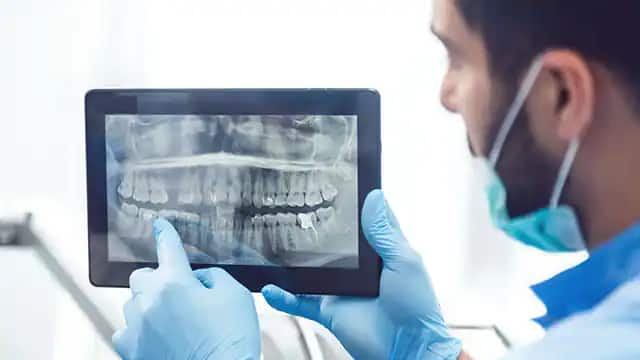How Does Bone Remodeling Work?
Your bones have two kinds of cells that do all the work to remodel your skeleton as needed. Osteoclasts break down old bone and deliver it into your bloodstream (resorption), and osteoblasts build your bone where it needs to be reinforced (ossification).
When you're a child, you create bone faster, and the process slows as you age. In fact, according to Duke Orthopedics, when you were in your first year of life, almost 100% of your skeleton was replaced, and as an adult, your bones remodel themselves at a rate of about 10% per year.
Bone remodeling is an important process for a lot of dental work. When orthodontists realign your teeth with braces, clear aligners, or other devices, resorption and ossification are what allows for the movement and strengthening of your teeth in a new position. If you need dental implants, bone growth around the metal gives you stable support on par with your actual teeth.
Symptoms of Jaw Bone Loss
You may not notice the early stages of bone loss in your jaw. As bone resorption increases, you may notice one or more of the following symptoms:
- Changes in your bite and facial structure
- Discomfort when you chew
- Wrinkles begin to form around your mouth
- Shifting or loosening of your teeth
- Lips begin to sink inward
- Wrinkled skin around your mouth
- Headaches, facial pain, and jaw pain
- Increased difficulty speaking
- If you wear dentures, changes in the fit and comfort of your replacement teeth
What Causes Bone Loss in the Jaw?
Bones are reinforced through osseointegration, where they are used the most. For your jawbone, when you chew and bite, the force you exert through your teeth into your jaws sends signals to osteoblasts to keep that bone strong.
If you're missing a tooth due to tooth extraction, gum disease, or injury, the jawbone in the area of loss no longer receives stimuli, osteoclasts will begin to break down the jawbone, and osteoblasts will no longer prioritize rebuilding the bone structure there. According to Frontiers in Physiology, new bone will still form, but at a slower rate than the bone that is being destroyed. Wearing dentures may increase the rate at which the bone deteriorates. If you wear dentures and they've become loose, it may be a result of bone loss, and they may require refitting.
Some other causes of bone loss in the jaw include:
- Gum disease, particularly periodontitis (severe gum disease), according to Mayo Clinic.
- Osteoporosis is a condition that makes bones in your body weak and brittle. According to the National Institutes of Health, it can also affect your jawbone,
- According to a study published in Medicine, orthodontic treatment has been shown to decrease bone density around the teeth that have been moved. Fortunately, the bone usually recovers back to its original strength in the months after treatment for healthy individuals.
What Are the Effects of Jawbone Loss?
In addition to the symptoms noted above, jawbone loss can cause you to lose teeth and make it difficult or impossible to give you replacement teeth (implants, removable bridges, or dentures) without an oral surgeon first performing a bone graft.
Jawbone loss can also lead to facial collapse, in which your mouth seems to fall back into your face, your chin becomes more pointed, and your facial muscles weaken. This will cause premature wrinkling around your mouth and a thinning of your lips. All of these changes tend to make you appear older than your actual age.
What are Treatment Options for Jawbone Loss?
If you're experiencing bone loss in your jaw, your treatment will largely depend on what's causing it, and your dental professional is best positioned to help you determine the source of the abnormal resorption. If you have one or more missing teeth and still have enough bone density, it may be recommended that you get dental implants. Implants not only replace teeth but also stimulate the bone and can restore the natural balance of osseointegration and resorption in your jaw.
If you've already experienced significant bone loss, bone grafting may be necessary before your dental professional can place an implant in your jaw. If your bone loss isn't related to tooth loss, bone grafting is still a treatment that can do more than replace bone, but stimulate bone growth, too.
If your high level of resorption is due to a condition like osteoporosis, your healthcare professional and dental professional may need to collaborate on treatment for you. The Mayo Clinic notes that bone loss caused by osteoporosis can be treated with various medications or hormone therapies depending on your age, gender, and whether or not you have other medical conditions.
Bone loss in your jawbone can seem frightening, but no matter what's causing your resorption, your dental professional can work with you to develop the best approach for treatment. Don't hesitate to make an appointment so they can help you get back to a level of oral health that will keep you smiling. You can do this!
Oral Care Center articles are reviewed by an oral health medical professional. This information is for educational purposes only. This content is not intended to be a substitute for professional medical advice, diagnosis or treatment. Always seek the advice of your dentist, physician or other qualified healthcare provider.
ORAL HEALTH QUIZ
What's behind your smile?
Take our Oral Health assessment to get the most from your oral care routine
ORAL HEALTH QUIZ
What's behind your smile?
Take our Oral Health assessment to get the most from your oral care routine















